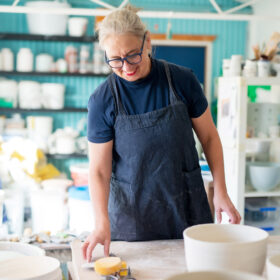In Kirsten Coelho, the first major publication on a practice spanning thirty years, images of Coelho’s impeccable vessels are interleaved with fragments of poetry and reproductions of paintings by Jean-Baptiste-Simeon Chardin, Russell Drysdale and Vilhelm Hammershoi. In a series of essays, author Wendy Walker traces the evolution of Coelho’s textured practice, in which an ever-expanding framework of art historical, literary and cinematic references has driven a succession of formal shifts – a shaping of changes. Inherited vocabularies are assimilated in hybridised multiple forms that are without replication. With the adoption of an ensemble mode of presentation, Kirsten Coelho’s small universes of transcultural objects transcend the familiarity of their everyday contexts to enshrine narratives of migration, transition and resettlement.

Kirsten Coelho works in porcelain, producing reduction fired works that attempt to fuse the formal and the abstract. More recently her work has been influenced by nineteenth and early twentieth century enamel wares and and the abstracted surface possibilities these objects can show as they begin to age.
‘I have always felt drawn to the abstract in art – the potential for understanding through an ambiguous and imperceptible type of knowing. Ceramic objects communicate on many levels and it is these possibilities of engagement and response that I find compelling. The intersection of form, colour, tone and light are the constant drivers.’ Kirsten Coelho, 2015
Kirsten trained in Adelaide at the South Australian School of Art before moving to the UK in the early 1990’s where she worked for a number of years in a London Studio. Since returning to Australia in 1998, Kirsten Coelho has completed a Master of Visual Art at the South Australian School of Art. Kirsten now works from a studio at her home in Adelaide, South Australia.
Public collections include:
Chatsworth House, Derbyshire UK; National Gallery of Australia; Newcastle Art Gallery, Australia; Queensland Art Gallery GOMA, Australia; City of Hobart Tasmania, Australia; Drill Hall Australian National University Canberra ACT, Australia